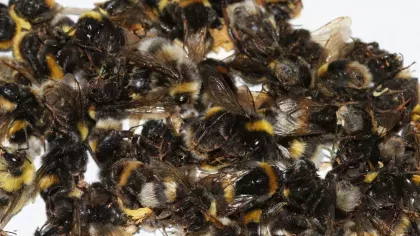26 January 2016
Kew’s Plant Names Services adopted by global health
Find out how Kew’s Medicinal Plant Names Services (MPNS) is involved in helping the world’s health regulators to ensure that herbal products are traded safely by supporting development of an important new medicinal standard.

Current confusion in herbal medicine
Herbal medicine is big business. It is estimated that in 2013, €614 million worth of herbal products were imported into the EU alone. What these products contain and what effects they may have, however, can be difficult to discover. Poor labelling and a lack of standard terminologies has led to considerable confusion among patients, practitioners and regulators alike.
Here are some serious consequences that arise from inconsistency and lack of clarity:
- Plants or remedies are mistakenly substituted for one another, occasionally with tragic results: one incident led to several deaths and 115 patients requiring dialysis for the rest of their lives.
- Health regulations are frequently published which are ambiguous or misleading.
- Regulators in different countries fail to communicate with one another because they use alternative names for the same plant.
- In some instances the same regulator will control use of one plant inconsistently, mistakenly listing a plant twice using different names
- Pharmacovigilance staff (who monitor the effects of medicinal drugs after they have been licensed for use) may miss patient records relating to adverse reactions to plant materials if they are unaware of all possible names in use for one plant.
Regulators are increasingly aware of these issues and some have taken considerable effort to improve the quality and consistency of the plant names they use. Scientific names are the obvious standard. However the use of these names for non-botanists is problematic: from a pharmacist’s perspective there are cryptic naming conventions, different botanical references contradict one another and names have an annoying habit of changing!
Can scientific names solve the problem?
Over centuries, Kew has amassed amazing and unique nomenclatural and taxonomic resources, including the International Plant Names Index (IPNI), World Checklist of Selected Plant Families (WCSPF) and The Plant List (TPL), which are continuously updated and curated. Although these resources are recognised and used by botanists worldwide, there is more that could be done to make our resources more relevant and accessible to non-botanists, for example, adding names as they are used in legislation (pharmaceutical and common names), replacing interfaces which appear confusing to non-botanists, and resolving contradictory taxonomic views.
Our Medicinal Plant Names Services (MPNS) has raised awareness among health regulators of health issues currently arising from inappropriate use of scientific names and is helping to improve the safety with which herbal products are traded and used. Increasingly, for example, this has led to MPNS being called upon to correct the names used by these agencies using a 'names validation' service.
International standards
Over the last ten years, the world’s health regulators have been working together with industry to define a global data standard entitled 'Identification of Medicinal Products' (IDMP). This standard, published by the International Standards Organisation (ISO), has been adopted by the US, European, and Japanese Health Regulators and promoted by the World Health Organisation’s Uppsala Monitoring Centre (WHO UMC).
IDMP covers all medicinal products from aspirin to nasal sprays including products derived from plants. MPNS was closely involved in the development of IDMP. Kew staff co-authored the ISO implementation guide for herbal medicines and MPNS provided 'Controlled Vocabularies' (a standardised list of terms to ensure consistency) for both plant names and plant parts. This enables regulators to check plant names used to register new products, and improve communication between industry and regulators about which substances are controlled and which plants are used in each medicinal product.
Formal adoption of the Controlled Vocabularies supplied by MPNS and ongoing use of these data within the regulatory framework demonstrates the value of our plant name data and taxonomic expertise to the health sector. It is also a clear endorsement of the reliability and comprehensiveness of Kew’s resources.
The Medicinal Plant Names Services approach
To become a trusted and reliable source within the Public Health domain, MPNS has worked to understand the regulatory processes, the divergent needs of the different audiences, and how plant names are currently used.
MPNS currently covers more than 13,800 medicinal plant species. The taxonomy of these species is recorded in Kew’s World Checklist of Selected Plant Families, a database curated by botanists that records the latest understanding of plant relationships (taxonomy) and how they are named (nomenclature). MPNS has prioritised systematic research into medicinal plants (especially those from plant families not previously published in the World Checklist) to ensure expert review of the names and relationships of plants of most importance to public health.
Alongside this work, MPNS has also been recording the common, pharmaceutical and (often misspelled) scientific names for herbal substances, along with the part(s) of the plant(s) used in each substance, from more than 100 key medicinal references.
MPNS has also undertaken consultancies for a range of organisations, including the US Food and Drug Administration (US FDA), the UK’s Medicines and Healthcare Products Regulatory Agency (MHRA), US Pharmacopoeia, and WHO UMC. Typically, we have taken the plant names used in these agencies own databases and corrected them with updated and verified information. This has allowed us to appreciate the benefits and cost savings achieved through use of MPNS services, whilst also generating income for Kew to help sustain the plant names resources that make this work possible.
Further work on regulations
MPNS is working closely with the US Food and Drug Administration (US FDA), who are building open-source software to manage the Identification of Medicinal Products (IDMP) datasets, for use by regulators globally. MPNS is developing software to update the IDMP Controlled Vocabulary for plant names as botanists improve and update Kew’s underlying taxonomies.
MPNS was invited to join a European Health Regulator task force charged with implementing the Identification of Medicinal Products (IDMP) across the EU in preparation for legislation that came into force during 2016 and 2017. This legislation establishes MPNS as part of the regulatory framework, encouraging pharmaceutical and herbal companies to turn to Kew for validated names (and synonyms) of plants they use in their own products.
We are delighted at this recognition of the value of our science and data within a new domain. We are seeking funding to develop our resources and services in order to address the needs of public health professionals dealing with food supplements, allergens and poisonous plants. Our intention is that the tools and methodologies developed here will also serve to address the needs of other disciplines such as Plant Health, Forestry and Agriculture.
References
Nortier, J. L. & Vanherweghem, J. L. (2002) Renal interstitial fibrosis and urothelial carcinoma associated with the use of a Chinese herb (Aristolochia fangchi). Toxicology 181-182: 577-580. Available online



